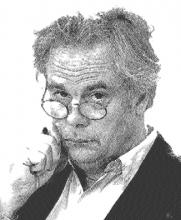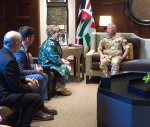You are here
The next US president and the Iraq war
May 28,2015 - Last updated at May 28,2015
As long as Jeb Bush stays in the race for president of the US, the issue of the Iraq war will not go away.
The fact that Iraq is descending into further chaos and that he is the brother of ex-president George W. Bush whose wilful invasion of Iraq catalysed Iraq’s implosion will see to that. And so it should.
When Bush junior was asked recently if he thought his brother’s policy in Iraq was right, he muffed his answer. He is going to be asked this question again and again.
So far, he has not been pinned down publicly on whether he supported his brother’s policy of using torture, including waterboarding. But he will be.
It is beyond understanding that Jeb has announced that his brother will be his principal adviser on the Middle East. His foreign policy team includes a number of people who were complicit in the decision to go to war. There is no evidence that they have changed their minds.
American politics now reached a rough consensus about the Iraq war: it was a mistake.
Americans belatedly realise that Bush pulled the wool over their eyes. The reaction may not be as strong as in the UK where ex-prime minister Tony Blair, who walked in lockstep with Bush, is now treated as a pariah by a large majority of the population, but it is there.
Over time, more and more Republican politicians admitted that the absence of weapons of mass destruction in Iraq — which Bush and Blair said were definitely there — undermined their rationale for the invasion in 2003.
Hilary Clinton, now the front-runner in the next election, voted in the Senate for war.
In 2003, when campaigning against Barack Obama, she did not have the courage to disavow her vote and this probably cost her the nomination.
Today she is openly admitting her mistake. In her book she wrote: “I got it wrong. Plain and simple.”
But it took her a decade to get to that point, not a good sign of an honest, open, searching character.
Jeb Bush, explaining his reluctance to clarify his position on the war, said: “Going back in time and talking about hypotheticals, the would-haves and the should-haves, does a disservice to the families of soldiers who gave their lives.”
But isn’t it true that their lives could have been saved if president Bush had not lied about the evidence he had and the war had never begun?
Blair’s ambassador to Washington wrote that the White House’s decision to topple Saddam Hussein was made before much evidence came in. The evidence was made to conform with the decision, he wrote.
And what about the civilians?
According to UNICEF, 30,000 children died for lack of nourishment and medical attention even before the invasion, because of the economic embargo.
During the war, the figure mushroomed. Does Jeb Bush include these facts in his explanation of how lives could have been saved?
Clearly not.
Republican Senator Rand Paul, who is also running for president, was blunt a couple of weekends ago when he told the employees of a tech company: “Every time we toppled a secular strongman, we’ve gotten chaos and more radical Islam, and we’re all less safe because of that.”
Col. Lawrence Wilkerson, the chief of staff of Colin Powell, the secretary of state under Bush, told his local paper that it was a “fair assessment” to say Iraq was better off under Saddam.
Of course, he does not say that Saddam was not an evil man, which he clearly was. But he knows that at least Iraq’s people were well fed, housed and had reasonable healthcare.
It is probable that in time Saddam might have been pushed aside by rivals. Even if not, he had had his wings badly clipped by the first Iraq war, which left him with no air force or navy, and an army with ageing equipment.
All this record should be grist for the media mill. But despite the movement in public opinion, most of the media seem intent on drawing a line under the subject.
Nor do they probe why Bush wanted the war.
Was it, he had convinced himself, that it would enhance American influence and respect around the world.
Was it a pilot project, testing out how to engineer regime change?
President Obama has done America — and the world — a great service by denouncing war and torture.
It will be near impossible for the next president to reverse this about turn.
Added to that, the US has made its peace with Cuba and is well on the way to do so with Iran. That, too, a future president will be unable to change.
But cleaning up the mess created by the invasion of Iraq may take decades.












